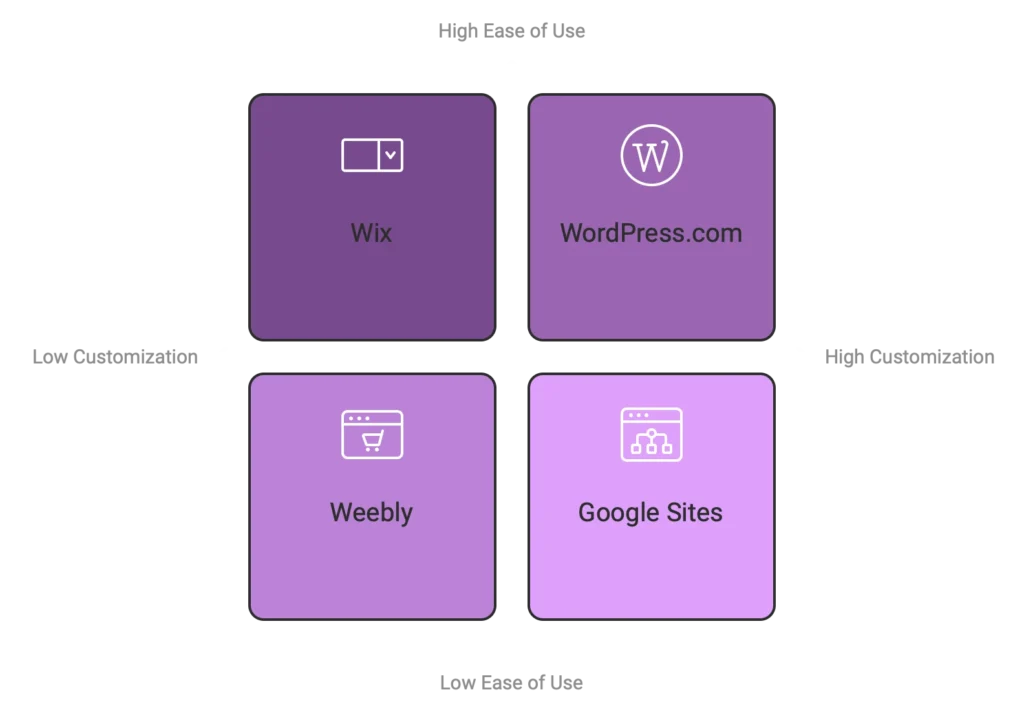Make a free website: What is the best site to use?

Finding the best site to make a free website is essential in today’s digital landscape. In today’s digital age, having a website is no longer a luxury—it’s a necessity. Learn more about my web development services to get started. Whether you’re a budding entrepreneur, an artist showcasing your portfolio, or simply looking to start a personal blog, a website is the gateway to your online presence. However, the cost of building and maintaining a site can be a hurdle for many, which is why free website-building platforms have surged in popularity. These tools empower individuals and small businesses to establish their online footprint without breaking the bank.
But not all free website builders are created equal. Each platform comes with its own set of features, limitations, and target audiences, making the choice more nuanced than it might seem at first glance. Understanding these differences is crucial to selecting the right tool that aligns with your goals. Whether you prioritize ease of use, design flexibility, or specific integrations, knowing what each platform offers ensures that your website doesn’t just exist—it thrives.
Section 1: Criteria for Choosing the Best Platform to Create a Free Website
Choosing the right free website builder is a decision that can greatly impact your online presence. To make an informed choice, it’s important to consider several key factors that determine whether a platform meets your specific needs. Discover my skills that align with these factors. Here are the main criteria to guide your selection:
Ease of Use: How to Make a Free Website Easily
The best free website builders simplify the process of creating a website, even for beginners. Look for platforms that offer intuitive interfaces, drag-and-drop editors, and guided tutorials. A tool that’s easy to navigate allows you to focus on content and design rather than technical complexities, ensuring a smooth experience from start to finish.
Customization Options: Build or Design a Free Website That Stands Out
Your website should reflect your unique brand or personality, making customization a critical factor. Platforms with a wide range of templates, flexible design tools, and editable features give you the freedom to create a site that stands out. However, keep in mind that free versions often come with limitations on how much you can tweak your website’s design and functionality.
Domain and Branding Restrictions When You Make or Create a Free Website
Most free website builders provide a domain as part of their service, but it often comes with branding attached. For example, your site might have a domain like yourname.wix.com or yourname.wordpress.com. Additionally, free plans typically include platform-specific ads that can detract from your site’s professionalism. If having a custom domain or ad-free site is important to you, this is a factor to consider.
Integration with Third-Party Tools for Building or Designing a Free Website
The ability to connect your website with third-party tools and services can significantly enhance its functionality. Features such as social media integration, email marketing tools, analytics, and e-commerce plugins expand your site’s capabilities. Free plans may offer limited integration options, so it’s worth checking if the platform supports the tools you need.
Suitability for Different Purposes: Make or Create a Free Website for Your Needs
Not all platforms are designed to meet every type of user’s needs. Some excel at blogging, while others cater to small businesses or portfolios. Think about the purpose of your website:
• Blogging: A platform like WordPress.com is ideal for text-heavy content.
• E-commerce: Weebly offers integrated online store features.
• Portfolio or Personal Sites: Google Sites and Jimdo provide simple solutions for showcasing work.
By aligning the platform’s strengths with your objectives, you can ensure a better fit for your project.
Evaluating free website builders against these criteria will help you find a platform that not only suits your needs but also allows you to make the most of your online presence without spending a dime.

Section 2: Detailed Comparison of Top Platforms to Make a Free Website
When it comes to free website builders, each platform has its own unique strengths and drawbacks. Here’s a detailed breakdown of five popular options to help you make an informed choice:
1. Wix
• Features: Wix is renowned for its user-friendly, drag-and-drop interface, which makes it easy for beginners to build a website without any coding skills. The platform offers a vast selection of customizable templates, along with built-in tools for search engine optimization (SEO) and social media integration. Whether you’re creating a personal portfolio, a blog, or a small business website, Wix provides flexibility and functionality.
• Limitations: The free version of Wix comes with some notable trade-offs. Your website will display Wix advertisements, and the domain will include “wix.com” (e.g., yourname.wix.com), which may not look professional. These limitations can affect the overall appearance and branding of your site.
2. WordPress.com
• Features: WordPress.com is a top choice for bloggers and content creators, thanks to its extensive library of themes and plugins. Its powerful content management system makes it easy to publish and organize text-heavy material. The platform also supports basic SEO features, making it ideal for those focused on content visibility.
• Limitations: The free version of WordPress.com has restricted customization options compared to its paid plans. Additionally, your domain will include “wordpress.com” (e.g., yourname.wordpress.com), and the platform displays ads on your site, which may be distracting for visitors.
3. Weebly
• Features: Weebly offers an intuitive, user-friendly interface, making it an excellent choice for small businesses and individuals. Its free plan includes a good selection of templates and tools, along with integrated e-commerce features for setting up online stores. The platform is designed to accommodate a wide range of users, from hobbyists to entrepreneurs.
• Limitations: While Weebly supports e-commerce, its free plan imposes restrictions on advanced e-commerce features like payment processing and inventory management. Like other platforms, Weebly also includes ads and a branded domain (e.g., yourname.weebly.com).
4. Google Sites
• Features: Google Sites is a simple and straightforward platform ideal for creating quick, no-frills websites. It integrates seamlessly with other Google services, such as Google Drive, making it a great choice for collaborative projects or basic informational sites. The platform is free of complexity, focusing on simplicity and functionality.
• Limitations: The design options on Google Sites are relatively basic compared to other website builders. If you need advanced customization or a more polished aesthetic, this platform might feel limiting.
5. Jimdo
• Features: Jimdo uses artificial intelligence to streamline the website creation process, helping users build a site quickly and easily. Its intuitive interface and decent customization options make it an appealing choice for those who prioritize speed and simplicity.
• Limitations: The free version of Jimdo has limited storage capacity and includes advertisements on your site. These constraints may hinder scalability if you plan to expand your website over time.
By comparing these platforms, you can identify which one aligns best with your specific needs, whether you prioritize ease of use, customization, or features tailored to blogging, e-commerce, or portfolios. Check out some of my works that were built with these considerations in mind.

Section 3: Tailoring the Choice for Those Who Want to Create a Free Website
Choosing the best free website builder ultimately depends on your specific goals and priorities. Different platforms cater to different needs, and aligning their strengths with your requirements is the key to success. Here’s how to tailor your choice:
For Simplicity and Speed: Google Sites or Jimdo
If your primary goal is to get a website up and running quickly, without diving into complex design or technical details, Google Sites and Jimdo are ideal options.
• Google Sites offers unparalleled ease of use with its straightforward interface and integration with Google Drive, making it perfect for simple projects like informational sites or collaborative efforts.
• Jimdo, on the other hand, leverages AI to guide you through the setup process, allowing you to create a functional website in minutes. It’s an excellent choice for users who value speed and minimal effort.
For Customization and Flexibility: Wix or WordPress.com
If you need a platform that allows you to express your creativity and build a website with more advanced features, Wix and WordPress.com are your go-to choices.
• Wix shines with its drag-and-drop editor, wide array of customizable templates, and robust integration options. It’s perfect for users who want full control over the look and feel of their site.
• WordPress.com is ideal for those focused on content-rich websites like blogs. With extensive themes and plugin support, it offers flexibility while remaining accessible to users without technical expertise.
For Small Businesses or E-Commerce: Weebly
Small business owners and aspiring online retailers will find Weebly to be a strong contender.
• Its integrated e-commerce tools make it easy to set up an online store, while its user-friendly interface ensures that even beginners can manage their site with ease. Whether you’re selling handmade products or offering services, Weebly’s free plan is a great starting point for small-scale e-commerce.
By focusing on what matters most to you—whether it’s simplicity, creative freedom, or business functionality—you can confidently choose the website builder that best fits your vision. Learn more about my journey on my About page.
Section 4: Pros and Cons Overview
To make your decision easier, here’s a tabular comparison of the top free website builders based on their features, limitations, and best use cases.
Platform: Wix
• Features: Drag-and-drop interface, customizable templates, SEO tools, social media integration.
• Limitations: Includes Wix-branded ads and domain (e.g., yourname.wix.com).
• Best Use Cases: Creative projects, small businesses.
Platform: WordPress.com
• Features: Extensive themes and plugins, ideal for text-heavy content like blogs.
• Limitations: Limited customization, WordPress-branded domain (e.g., yourname.wordpress.com).
• Best Use Cases: Blogging, content-focused websites.
Platform: Weebly
• Features: User-friendly, integrated e-commerce tools, good selection of templates.
• Limitations: Limited e-commerce features, includes branded ads.
• Best Use Cases: Small businesses, e-commerce startups.
Platform: Google Sites
• Features: Simple interface, seamless integration with Google Drive.
• Limitations: Basic design options, lack of advanced features.
• Best Use Cases: Informational websites, collaborative projects.
Platform: Jimdo
• Features: AI-assisted site building, intuitive interface, decent customization.
• Limitations: Limited storage, includes advertisements.
• Best Use Cases: Quick personal or small-scale projects.
This comparison highlights the strengths and weaknesses of each platform, helping you choose the one that best aligns with your website’s purpose and requirements.

Conclusion
When it comes to creating a free website, the variety of platforms available ensures that there’s something for everyone. Each platform we discussed offers unique features tailored to different needs, along with specific limitations to consider.
• Wix stands out for its drag-and-drop customization and is ideal for creative projects and small businesses.
• WordPress.com is a go-to choice for bloggers and content-heavy sites due to its extensive themes and plugins.
• Weebly combines user-friendliness with e-commerce functionality, making it perfect for small businesses and online stores.
• Google Sites offers a no-frills, straightforward solution for informational sites or collaborative projects.
• Jimdo provides quick site-building through AI, catering to users who prioritize speed and simplicity.
The right platform for you depends on your specific goals and priorities. If you value simplicity and speed, Google Sites or Jimdo are excellent choices. For those who need more creative freedom and design flexibility, Wix or WordPress.com may be more suitable. If your focus is on small-scale e-commerce, Weebly provides the necessary tools to get started.
By carefully evaluating your objectives and weighing the features and limitations of each platform, you can confidently choose the one that best aligns with your vision. Regardless of your choice, these tools enable you to establish a strong online presence without any upfront cost. Need assistance? Feel free to contact me.


